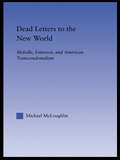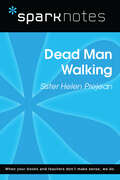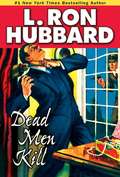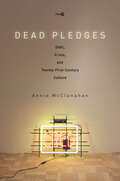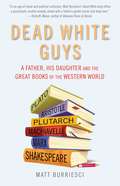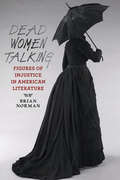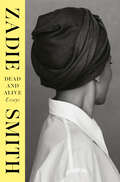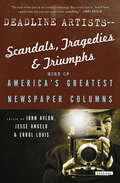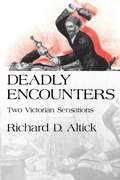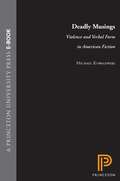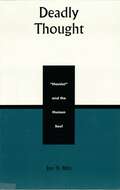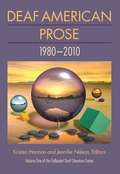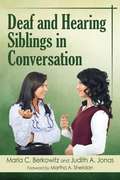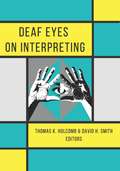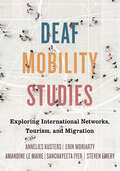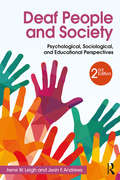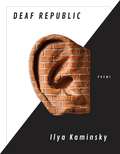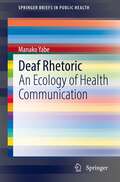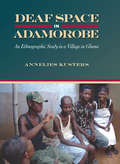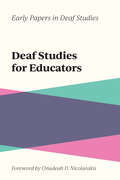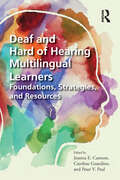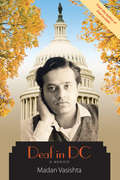- Table View
- List View
Dead Letters to the New World: Melville, Emerson, and American Transcendentalism (Literary Criticism and Cultural Theory)
by Michael McLoughlinThis book contextualises and details Herman Melville's artistic career and outlines the relationship between Melville and Ralph Waldo Emerson. Michael McLoughlin divides Melville's professional career as a novelist into two major phases corresponding to the growth and shift in his art. In the developmental phase, from 1845 to 1850, Melville wrote his five Transcendental novels of the sea, in which he defended self-reliance, attacked conformity, and learned to employ Transcendental symbols of increasing complexity. This phase culminates in Moby-Dick , with its remarkable matching of Transcendental idealism with tragic drama, influenced by Hawthorne. After 1851, Melville endeavoured to find new ways to express himself and to re-envision human experience philosophically. In this period of transition, Melville wrote anti-Transcendental fiction attacking self-reliance as well as conformity and substituting fatalism for Emersonian optimism. According to McLoughlin, Moby-Dick represents an important transitional moment in Herman Melville's art, dramatically altering tendencies inherent in the novels from Typee onward; in contrast to Melville's blithely exciting and largely optimistic first six novels of the sea, Melville's later works - beginning with his pivotal epic Moby-Dick - assume a much darker and increasingly anti-Transcendental philosophical position.
Dead Man Walking (SparkNotes Literature Guide Series)
by SparkNotesDead Man Walking (SparkNotes Literature Guide) by Helen Prejean Making the reading experience fun! Created by Harvard students for students everywhere, SparkNotes is a new breed of study guide: smarter, better, faster.Geared to what today's students need to know, SparkNotes provides:chapter-by-chapter analysis explanations of key themes, motifs, and symbols a review quiz and essay topics Lively and accessible, these guides are perfect for late-night studying and writing papers.
Dead Men Kill
by L. Ron HubbardBloodcurdling suspense... When several of the city's most respected citizens are inexplicably killed by what appear to be zombies, all Detective Terry Lane has to go on is a blue grey glove, a Haitian pharmacy bill for some very unusual drugs and a death threat from a mysterious stranger. Matters are soon complicated when a beautiful nightclub singer shows up who claims to have information that could solve the case, but whose motives are plainly suspect. Against his better judgment, Terry investigates her lead only to find himself sealed in a coffin en route to the next zombie murder--his own."DEAD MEN KILL is frightful fun from yesteryear."-- Fangoria* An International Book Awards Winner
Dead Pledges: Debt, Crisis, and Twenty-First-Century Culture
by Annie McclanahanDead Pledges is the first book to explore the ways that U.S. culture--from novels and poems to photojournalism and horror movies--has responded to the collapse of the financialized consumer credit economy in 2008. Connecting debt theory to questions of cultural form, this book argues that artists, filmmakers, and writers have re-imagined what it means to owe and to own in a period when debt is what makes our economic lives possible. Encompassing both popular entertainment and avant-garde art, the post-crisis productions examined here help to map the landscape of contemporary debt: from foreclosure to credit scoring, student debt to securitized risk, microeconomic theory to anti-eviction activism. A searing critique of the ideology of debt, Dead Pledges dismantles the discourse of moral obligation so often invoked to make us repay. Debt is no longer a source of economic credibility, it contends, but is a system of dispossession that threatens the basic fabric of social life.
Dead White Guys
by Matt BurriesciDead White Guys is a timely defense of the great books, arriving in the middle of a national debate about the fate of these books in high schools and universities around the country. Burriesci shows how the great books can enrich our lives as individuals, as citizens, and in our careers. Extending the argument first made by Anna Quinndlen's on the act of reading itself, How Reading Changed My Life," ("It is like the rubbing of two sticks together to make a fire, the act of reading, an improbable pedestrian task that leads to heat and light,) Burriesci reminds us all of the enormous impact reading has on our lives. After his daughter was born prematurely in 2010, Burriesci set out to write a book about 26 Great Books, from Plato to Karl Marx, and how their lessons have applied to his life. As someone who has spent a long and successful career advocating for great literature, Burriesci defends the great books in this series of tender and candid letters, rich in personal experience and full of humor. Matt Burriesci is a national literary leader, serving as Executive Director of both PEN/Faulkner, which bestows the largest peer-juried prize for fiction
Dead White Guys: A Father, His Daughter and the Great Books of the Western World
by Matt BurriesciDead White Guys is a timely defense of the great books, arriving in the middle of a national debate about the fate of these books in high schools and universities around the country. Burriesci shows how the great books can enrich our lives as individuals, as citizens, and in our careers. Extending the argument first made by Anna Quinndlen's on the act of reading itself, How Reading Changed My Life," ("It is like the rubbing of two sticks together to make a fire, the act of reading, an improbable pedestrian task that leads to heat and light,) Burriesci reminds us all of the enormous impact reading has on our lives. After his daughter was born prematurely in 2010, Burriesci set out to write a book about 26 Great Books, from Plato to Karl Marx, and how their lessons have applied to his life. As someone who has spent a long and successful career advocating for great literature, Burriesci defends the great books in this series of tender and candid letters, rich in personal experience and full of humor. Matt Burriesci is a national literary leader, serving as Executive Director of both PEN/Faulkner, which bestows the largest peer-juried prize for fiction
Dead Women Talking: Figures of Injustice in American Literature
by Brian NormanDead women speak as agents of social justice in work by some of the best-known writers of American literature.Brian Norman uncovers a curious phenomenon in American literature: dead women who nonetheless talk. These characters appear in works by such classic American writers as Poe, Dickinson, and Faulkner as well as in more recent works by Alice Walker, Toni Morrison, Tony Kushner, and others. These figures are also emerging in contemporary culture, from the film and best-selling novel The Lovely Bones to the hit television drama Desperate Housewives. Dead Women Talking demonstrates that the dead, especially women, have been speaking out in American literature since well before it was fashionable. Norman argues that they voice concerns that a community may wish to consign to the past, raising questions about gender, violence, sexuality, class, racial injustice, and national identity. When these women insert themselves into the story, they do not enter precisely as ghosts but rather as something potentially more disrupting: posthumous citizens. The community must ask itself whether it can or should recognize such a character as one of its own. The prospect of posthumous citizenship bears important implications for debates over the legal rights of the dead, social histories of burial customs and famous cadavers, and the political theory of citizenship and social death.
Dead and Alive: Essays
by Zadie SmithA profound and unparalleled literary voice, Zadie Smith returns with a resounding collection of essaysIn this eagerly awaited new collection, Zadie Smith brings her unique skills as an essayist to bear on a range of subjects that have captured her attention in recent years.She takes an exhilaratingly close look at artists Toyin Ojih Odutola, Kara Walker and Celia Paul. She invites us along to the movies, to see and to think about Tár, and to New York to reflect on the spontaneous moments that connect us. She takes us on a walk down Kilburn High Road in her beloved North-West London and welcomes us to mourn with her the passing of writers Joan Didion, Martin Amis, Hilary Mantel, Philip Roth and Toni Morrison. She considers changes of government on both sides of the Atlantic – and the meaning of "the commons" in all our lives.Throughout this thrilling collection, Zadie Smith shows us once again her unrivalled ability to think through critically and humanely some of the most urgent preoccupations and tendencies of our troubled times.
Dead and Alive: Essays
by Zadie SmithA profound and unparalleled literary voice, Zadie Smith returns with a resounding collection of essays.In the past two decades, few writers have mastered the craft and art of the essay in the way that Zadie Smith has. Her writing, at once an occasion for personal reckoning and communal reflection, studies the fault lines that divide us and consistently finds grounds for solidarity and compassion.This eagerly awaited new collection brings Smith&’s dexterity as an essayist to bear on a range of subjects that have captured her attention in recent years. Organized in five thematic sections—eyeballing, considering, reconsidering, mourning, and confessing—she unspools intimate dialogues with various sources of inspiration. She takes an exhilaratingly close look at artists Toyin Ojih Odutola and Kara Walker. She invites us along to the movies in her review of Tár, a Pulitzer Prize finalist, and to her desk while researching the Tichborne trial and writing her New York Times bestselling novel The Fraud. She asks us to take another look at Flannery O'Connor and to mourn with her the passing of writers Joan Didion, Martin Amis, Hilary Mantel, Philip Roth, and Toni Morrison. And she shows us once again in Dead and Alive her unrivaled ability to think through, critically and humanely, some of the most urgent preoccupations of our troubled times.With an eye towards the past and the present, Smith examines what it means to identify with our contemporary world and the history that frames it.
Deadline
by James RestonThis book contains the memoirs of the New York Times columnist James Reston in which he expresses his opinion about many world-famous leaders.
Deadline Artists—Scandals, Tragedies & Triumphs: More of America's Greatest Newspaper Columns
by Jack London H. L. Mencken Carl Hiaasen Molly Ivins Peggy Noonan Murray Kempton Mitch Albom Richard Wright Steve Lopez Pete Hamill Nicholas Kristof Damon Runyon Leonard Pitts Jr. Dorothy Thompson Shirley Povich Mike Ryoko Ruben Salazar Mary McGrory Mike BarnicleAn anthology of newspaper columns from the 19th century to the present—&“engaging eyewitness pieces [that] elicit admiration, wonder and gasps of surprise&” (Kirkus Reviews). Deadline Artists: America&’s Greatest Newspaper Columns drew together some of the finest examples of America&’s greatest unsung literary form: the newspaper column. In this new Deadline Artists collection, some of America&’s greatest journalists take on the stories of scandal, tragedy, triumph, and tribute that have defined the spirit of their age. This is history written in the present tense, offering high drama and enduring wisdom. Walk with Jack London in the aftermath of the San Francisco earthquake or grieve with Walt Whitman over the assassination of Abraham Lincoln. Watch as Watergate unfolds, sex scandals explode, the Twin Towers collapse, and winning home runs capture the thrill of a comeback capped with a World Series victory. Contributors include: Jack London, H.L. Mencken, Dorothy Thompson, Richard Wright, Damon Runyon, Shirley Povich, Murray Kempton, Mike Ryoko, Ruben Salazar, Mary McGrory, Mike Barnicle, Molly Ivins, Pete Hamill, Carl Hiaasen, Nicholas Kristof, Leonard Pitts, Steve Lopez, Peggy Noonan, and Mitch Albom.
Deadly Encounters
by Richard D. AltickIn July 1861 London newspapers excitedly reported two violent crimes, both the stuff of sensational fiction. One involved a retired army major, his beautiful mistress and her illegitimate child, blackmail and murder. In the other, a French nobleman was accused of trying to kill his son in order to claim the young man's inheritance. The press covered both cases with thoroughness and enthusiasm, narrating events in a style worthy of a popular novelist, and including lengthy passages of testimony. Not only did they report rumor as well as what seemed to be fact, they speculated about the credibility of witnesses, assessed character, and decided guilt. The public was enthralled.Richard D. Altick demonstrates that these two cases, as they were presented in the British press, set the tone for the Victorian "age of sensation." The fascination with crime, passion, and suspense has a long history, but it was in the 1860s that this fascination became the vogue in England. Altick shows that these crimes provided literary prototypes and authenticated extraordinary passion and incident in fiction with the "shock of actuality." While most sensational melodramas and novels were by lesser writers, authors of the stature of Dickens, Thackeray, George Eliot, Trollope, Hardy, and Wilkie Collins were also influenced by the spirit of the age and incorporated sensational elements in their work.
Deadly Musings: Violence and Verbal Form in American Fiction
by Michael Kowalewski"Violent scenes in American fiction are not only brutal, bleak, and gratuitous," writes Michael Kowalewski. "They are also, by turns, comic, witty, poignant, and sometimes, strangely enough, even terrifyingly beautiful." In this fascinating tour of American fiction, Kowalewski examines incidents ranging from scalpings and torture in The Deerslayer to fish feeding off human viscera in To Have and Have Not, to show how highly charged descriptive passages bear on major issues concerning a writer's craft. Instead of focusing on violence as a socio-cultural phenomenon, he explores how writers including Cooper, Poe, Crane, Hemingway, Faulkner, Wright, Flannery O'Connor, and Pynchon draw on violence in the realistic imagining of their works and how their respective styles sustain or counteract this imagining. Kowalewski begins by offering a new definition of realism, or realistic imagining, and the rhetorical imagination that seems to oppose it. Then for each author he investigates how scenes of violence exemplify the stylistic imperatives more generally at work in that writer's fiction. Using violence as the critical occasion for exploring the distinctive qualities of authorial voice, Deadly Musings addresses the question of what literary criticism is and ought to be, and how it might apply more usefully to the dynamics of verbal performance.
Deaf American Prose, 1980–2010
by Jennifer L. Nelson Kristen C. HarmonIn Deaf life, the personal narrative holds sway because most Deaf individuals recall their formative years as solitary struggles to understand and to be understood. Few deaf people in the past related their stories in written form, relying instead on a different kind of "oral" tradition, that of American Sign Language. During the last several decades, however, a burgeoning bilingual deaf experience has ignited an explosion of Deaf writing that has pushed the potential of ASL-influenced English to extraordinary creative heights. Deaf American Prose: 1980-2010 presents a diverse cross-section of stories, essays, memoirs, and novel excerpts by a remarkable cadre of Deaf writers that mines this rich, bilingual environment. The works in Deaf American Prose frame the Deaf narrative in myriad forms: Tom Willard sends up hearing patronization in his wicked satire "What Exactly Am I Supposed to Overcome?" Terry Galloway injects humor in "Words," her take on the identity issues of being hard of hearing rather than deaf or hearing. Other contributors relate familiar stories about familiar trials, such as Tonya Stremlau's account of raising twins, and Joseph Santini's short story of the impact on Deaf and hearing in-laws of the death of a son. The conflicts are well-known and heartfelt, but with wrinkles directly derived from the Deaf perspective. Several of the contributors expand the Deaf affect through ASL glosses and visual/spatial elements. Sara Stallard emulates ASL on paper through its syntax and glosses, and by eliminating English elements, a technique used in dialogue by Kristen Ringman and others. Deaf American Prose features the work of other well-known contemporary Deaf writers, including co-editor Kristen Harmon, Christopher Jon Heuer, Raymond Luczak, and Willy Conley. The rising Deaf writers presented here further distinguish the first volume in this new series by thinking in terms of what they can bring to English, not what English can bring to them.
Deaf And Hearing Siblings In Conversation
by Marla C. Berkowitz Judith A. JonasThis is the first book to consider both deaf and hearing perspectives on the dynamics of adult sibling relationships. Deaf and hearing authors Berkowitz and Jonas conducted interviews with 22 adult siblings, using ASL and spoken English, to access their intimate thoughts. A major feature of the book is its analysis of how isolation impacts deaf-hearing sibling relationships. The book documents the 150 year history of societal attitudes embedded in sibling bonds and identifies how the siblings' lives were affected by the communication choices their parents made. The authors weave information throughout the text to reveal attitudes toward American Sign Language and the various roles deaf and hearing siblings take on as monitors, facilitators, signing-siblings and sibling-interpreters, all of which impact lifelong bonds. Included: questions for guided discussion, extensive bibliography, and other features.
Deaf Eyes on Interpreting
by Thomas K. Holcomb David H. SmithAs the ASL-English interpreting field has become professionalized, there is a growing disconnect between interpreters and the Deaf consumers they serve. Whereas interpreting used to be a community-based practice, the field is growing into a research-based profession that begins in a classroom rather than in the Deaf community. Despite the many gains being made in the interpreting services profession, with an emphasis on the accuracy of the interpreted work, the perspectives of Deaf individuals are rarely documented in the literature. Opportunities for enhanced participation and full inclusion need to be considered in order for Deaf people to best represent themselves to the hearing, nonsigning public as competent and intelligent individuals. Deaf Eyes on Interpreting brings Deaf people to the forefront of the discussions about what constitutes quality interpreting services. The contributors are all Deaf professionals who use interpreters on a regular basis, and their insights and recommendations are based on research as well as on personal experiences. These multiple perspectives reveal strategies to maximize access to interpreted work and hearing environments and to facilitate trust and understanding between interpreters and Deaf consumers. Interpreter educators, interpreting students, professional interpreters, and Deaf individuals will all benefit from the approaches offered in this collection.
Deaf Mobility Studies: Exploring International Networks, Tourism, and Migration
by Erin Moriarty Annelies Kusters Amandine le Maire Sanchayeeta Iyer Steven EmeryDeaf Mobility Studies revolutionizes how we think about deaf people’s international experiences. Equipped with a common theoretical framework, a team of five deaf ethnographers journeyed alongside their participants to delve into a rich array of experiences — ranging from career advancements and marriages to tourism and the challenges faced by deaf refugees. The authors present their findings within the framework of Deaf Mobility Studies, which brings together the transdisciplinary fields of Deaf Studies and Mobility Studies. Far from taking 'deaf cosmopolitanism' as a given, this work scrutinizes it as a multifaceted phenomenon to be both affirmed and questioned. Themes that emerge include how deaf people seek spaces of belonging, engage in languaging, expand their networks, and experience immobility. The text is augmented by direct links to clips in nine ethnographic films, analysis of selected film excerpts and screenshots, and compelling data visualizations. Deaf Mobility Studies is an expansive odyssey through the complexities and opportunities inherent in deaf international mobility.
Deaf People and Society: Psychological, Sociological and Educational Perspectives
by Irene W. Leigh Jean F. AndrewsDeaf People and Society incorporates multiple perspectives related to the topics of psychology, education, and sociology, including the viewpoints of deaf adults themselves. In doing so, it considers the implications of what it means to be deaf or hard of hearing and how deaf adults’ lives are impacted by decisions that professionals make, whether in the clinic, the school, or when working with family. This second edition has been thoroughly revised and offers current perspectives on the following topics:<P><P> * Etiologies of deafness and the identification process<P> * The role of auditory access<P> * Cognition, language, communication, and literacy<P> * Bilingual, bilingual/bimodal, and monolingual approaches to language learning<P> * Educational, legal, and placement aspects<P> * Childhood psychological issues<P> * Psychological and sociological viewpoints of deaf adults<P> * The criminal justice system and deaf people<P> * Psychodynamics of interaction between deaf and hearing people<P> Each chapter begins with a set of objectives and concludes with suggested readings for further research. This edition contains 10 new and original case studies, including ones on hearing children of deaf adults, sudden hearing loss, a young deaf adult with mental illness, and more. Written by a seasoned deaf/hearing bilingual team, this unique text continues to be the go-to resource for students and future professionals interested in working with deaf and hard-of-hearing persons.
Deaf Republic: Poems
by Ilya KaminskyFinalist for the National Book Award • Finalist for the PEN/Jean Stein Award • Finalist for the National Book Critics Circle Award • Winner of the Los Angeles Times Book Prize • Winner of the Anisfield-Wolf Book Award • Winner of the National Jewish Book Award • Finalist for the Kingsley Tufts Poetry Award • Finalist for the T. S. Eliot Prize • Finalist for the Forward Prize for Best CollectionIlya Kaminsky’s astonishing parable in poems asks us, What is silence?Deaf Republic opens in an occupied country in a time of political unrest. When soldiers breaking up a protest kill a deaf boy, Petya, the gunshot becomes the last thing the citizens hear—they all have gone deaf, and their dissent becomes coordinated by sign language. The story follows the private lives of townspeople encircled by public violence: a newly married couple, Alfonso and Sonya, expecting a child; the brash Momma Galya, instigating the insurgency from her puppet theater; and Galya’s girls, heroically teaching signing by day and by night luring soldiers one by one to their deaths behind the curtain. At once a love story, an elegy, and an urgent plea, Ilya Kaminsky’s long-awaited Deaf Republic confronts our time’s vicious atrocities and our collective silence in the face of them.
Deaf Rhetoric: An Ecology of Health Communication (SpringerBriefs in Public Health)
by Manako YabeThis book guides healthcare professionals, hospital administrators, and medical interpreters in the United States (and internationally) in ways to better communicate with Deaf and Hard of Hearing (D/HH) patients and sign language interpreters in healthcare settings. It also provides an overview of the healthcare communication issues with healthcare professionals and D/HH patients, and the advantages and disadvantages of using in-person interpreters vs. video remote interpreting (VRI). Due to technology development, hospital administrators have popularized the use of VRI and reduced the number of in-person interpreting services, which have negatively affected the quality of medical interpreting services and patient-provider communication. The COVID-19 pandemic also has accelerated the move toward more VRI, particularly in the US.The book addresses an understudied aspect of access and is written by an international deaf researcher from Japan who uses American Sign Language (ASL) and English as non-native languages. In order to identify appropriate interpreting services for specific treatments, the author focuses on healthcare professionals' and D/HH patients' interpreting preferences for critical and non-critical care in the US, and offers a new theoretical framework, an Ecology of Health Communication, to contextualize and analyze these preferences. The ecological matrix and its five analytical dimensions (i.e., physical-material, psychological, social, spatial, and temporal) allow readers to understand how these dimensions influence healthcare professionals' and D/HH patients' interpreting preferences as well as the treatment outcomes. This book concludes by prioritizing the use of an appropriate interpreter for specific treatments and allocating funds for in-person interpreters for critical care treatments.Deaf Rhetoric: An Ecology of Health Communication is primarily designed for healthcare professional students and professionals, hospital administrators, medical interpreters, VRI companies, and healthcare researchers. Scholars interested in the communication preferences of healthcare professionals and deaf people also will find this text useful. The book counters some of the power differences between healthcare providers and those who use medical services, and subtly reminds others that deaf people are not solely the receivers of medical care but actually are full people. The field of health care is growing and medical schools are increasingly called on to address cultural competencies; this resource provides a needed intervention.
Deaf Space in Adamorobe: An Ethnographic Study in a Village in Ghana
by Annelies KustersShared signing communities consist of a relatively high number of hereditarily deaf people living together with hearing people in relative isolation. In the United States, Martha's Vineyard gained mythical fame as a paradise for deaf people where everyone signed up until the 19th century. That community disappeared when deaf people left the island, newcomers moved in, married locals, and changed the gene pool. These unique communities still exist, however, one being the Akan village in Ghana called Adamorobe. Annelies Kusters, a deaf anthropologist, traveled to Adamorobe to conduct an ethnographic study of how deaf and hearing people live together in the village. In her new book, Kusters reveals how deaf people in Adamorobe did not live in a social paradise and how they created "deaf spaces" by seeking each other out. Deaf Space in Adamorobe reveals one example of the considerable variation in shared signing communities regarding rates of sign language proficiency and use, deaf people's marriage rates, deaf people's participation in village economies and politics, and the role of deaf education. Kusters describes spaces produced by both deaf and hearing people as a cohesive community where living together is an integral fact of their sociocultural environments. At the same time, Kusters identifies tension points between deaf and hearing perspectives and also between outside perspectives and discourses that originated within the community. Because of these differences and the relatively high number of deaf people in the community, Kusters concludes it is natural that they form deaf spaces within the shared space of the village community.
Deaf Studies for Educators (Early Papers in Deaf Studies #2)
by Onudeah D. NicolarakisAs Deaf Studies emerged in the 1970s and 1980s as a field of academic study and inquiry, the importance of Deaf Studies in education became an area of interest among thought leaders of the time. Deaf Studies for Educators is a collection of papers from a 1991 conference convened to explore Deaf Studies as a framework for teaching and learning. American Sign Language literature and poetry, bilingual and bicultural programs, arts and history, and deaf identity are several of the topics covered. This collection captures how educators understood early on the benefits of a curriculum that was more fully inclusive and reflective of deaf culture and deaf experiences. A foreword by Onudeah D. Nicolarakis contextualizes the work for modern audiences. This is the second volume in the Early Papers in Deaf Studies series, which consists of reissued works originally published by the Gallaudet University College for Continuing Education but long out of print. The aim of this series is to restore these foundational papers to the scholarly community. Deaf Studies for Educators is available in both print and open digital formats, ensuring broad access to this important contribution to the literature.
Deaf and Hard of Hearing Multilingual Learners: Foundations, Strategies, and Resources
by Peter V. Paul Caroline Guardino Joanna E. CannonThis critical resource provides foundational information and practical strategies for d/Deaf or hard of hearing (d/Dhh) multilingual learners. These learners come from backgrounds where their home languages differ from the dominant spoken or sign languages of the culture. This book is a one-stop resource for professionals, interventionists, and families, helping them to effectively support the diverse needs of d/Dhh multilingual learners by covering topics such as family engagement, assessment, literacy, multiple disabilities, transition planning, and more. The book provides vignettes of learners from 25 countries, discussion questions, and family-centered infographic briefs that synthesize each chapter. Deaf and Hard of Hearing Multilingual Learners is a groundbreaking step towards better supporting the many languages and cultures d/Dhh students experience in their lifetimes through strength-based and linguistically responsive approaches.
Deaf in DC: A Memoir
by Madan VasishtaIn his first memoir, Madan Vasishta described being a deaf boy in his homeland India, where "deaf" meant someone who is not human. After rising from herding cattle to being a respected photographer in Delhi, his first memoir concluded with his acceptance at Gallaudet College far away in America. Vasishta's new memoir begins with his arrival in Washington, DC in 1967 with $40.00 in his pocket and very little knowledge of the new worlds he was entering. Vasishta faced myriad challenges from the outset-- he knew no American Sign Language and could not speech read, yet he found himself thrust into classes at Gallaudet two weeks into the semester. Cultural differences mystified him, such as how all American car accidents were someone else's fault even when one's car hits a stationary object. He was amazed that his fellow students did not deride him for his mistakes, unlike in India where he would have been scorned for his weakness. After five years, he returned home to India for a visit and was stunned to learn that he no longer fit in, that "even if you do not have an American Dream, the American Dream will have you." Deaf in DC follows Vasishta through half a century living in America. He witnessed the transformation from facing bias as a deaf, foreign man of color who could not get a job despite having a Ph.D., to receiving five offers as a school superintendent in the wake of the Civil Rights movement and Deaf President Now. His new memoir reflects a genuine worldview informed by the sage perceptions of a person who has lived widely in many worlds.
